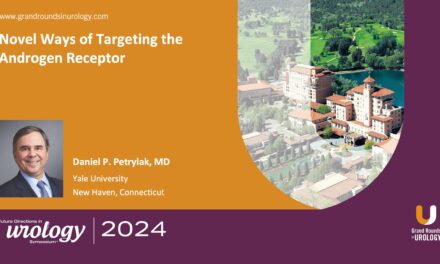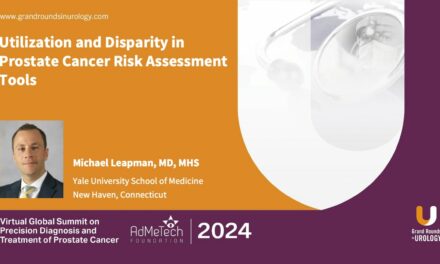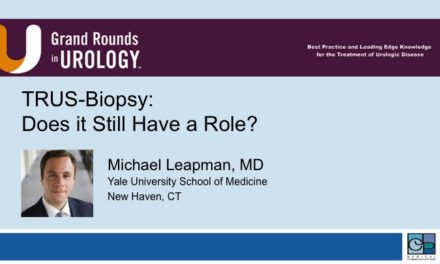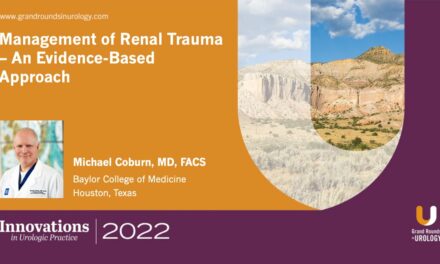OVERVIEW
Reporting from Berlin shortly after attending the ESMO 2025 Congress, Dr. Andrew W. Hahn of MD Anderson Cancer Center, Houston, Texas, provided a concise summary of key genitourinary oncology presentations, focusing in this segment on prostate cancer.
His 10-minute overview highlighted several major clinical trials across disease stages—from localized high-risk disease to biochemical recurrence and metastatic settings—offering top-line results and take-home points.
ENZARAD Trial
The ENZARAD trial, presented by Dr. Paul Nguyen of Dana-Farber Cancer Institute, evaluated androgen deprivation therapy (ADT) plus enzalutamide versus ADT plus a non-steroidal antiandrogen for two years in men with localized high-risk, very-high-risk, or node-positive prostate cancer undergoing definitive radiation therapy.
- Population: 802 patients; 11% had clinical N1 disease by conventional imaging.
- Primary endpoint: Metastasis-free survival (MFS).
- Results: At eight years, there was a 12 % reduction in hazard for metastasis in the group receiving ADT with enzalutamide, which was not statistically significant.
Overall survival showed a similar non-significant 12 % reduction in hazard of death. - Exploratory findings: A possible benefit among patients who received pelvic-field radiation and those with clinical M1 disease.
Dr. Hahn noted that although interesting, these findings do not change clinical practice and should not alter the current use of ADT plus abiraterone in similar patients.
PRESTO Trial
Presented by Dr. Rahul Aggarwal of the University of California, San Francisco, the PRESTO trial enrolled men with biochemically recurrent prostate cancer (PSA-doubling time < 9 months; negative conventional imaging).
Patients were randomized to one year of ADT, ADT plus apalutamide, or ADT plus apalutamide and abiraterone acetate.
- Primary endpoint: PSA progression-free survival (previously reported as improved).
- Secondary endpoints: MFS, time to castration resistance, and PSA PFS in a eugonadal (normal testosterone) state.
- Results: At a median follow-up of 61 months (503 patients), neither intensified regimen significantly improved MFS.
Hazard reductions were 20% for ADT plus apalutamide and 8% for triple therapy.
Both experimental arms, however, significantly delayed castration resistance and improved PSA control.
Dr. Hahn described these findings as informative but not practice-changing.
EMBARK Trial
The EMBARK trial compared ADT alone, ADT plus enzalutamide, and enzalutamide monotherapy in men with biochemical recurrence and negative conventional imaging.
- Key outcome: ADT plus enzalutamide achieved a 41 % reduction in hazard of death, with an absolute 9 % survival improvement at eight years.
- Enzalutamide monotherapy did not reach statistical significance for overall survival.
Dr. Hahn called these results “a very impressive accomplishment,” emphasizing that they firmly establish ADT plus enzalutamide as a preferred approach in this patient population.
[¹⁷⁷Lu]Lu-PSMA-617 (Pluvicto®) vs Docetaxel in mCRPC
A Canadian cooperative-group study presented by Dr. Kim Chi compared [¹⁷⁷Lu]Lu-PSMA-617 with docetaxel in patients with metastatic castration-resistant prostate cancer (mCRPC).
- Primary endpoint: Progression-free survival — not met.
- Overall survival: Favored docetaxel, with a 64 % reduction in hazard of death and median survival of 18 months vs 14 months for Lu-PSMA-617.
Dr. Hahn described the findings as provocative but emphasized the need for further analysis, noting that questions about crossover and patient selection remain unresolved.
CAPItello-281 Trial
Presented by Dr. Karim Fizazi, CAPItello-281 evaluated ADT plus abiraterone acetate ± capivasertib, an oral Akt inhibitor, in men with metastatic hormone-sensitive prostate cancer (mHSPC) and ≥ 90 % PTEN loss by immunohistochemistry (IHC).
- Screening and enrollment: Approximately 6,000 screened to enroll ~1,000 patients.
- Primary endpoint: Radiographic progression-free survival (rPFS).
- Results: Adding capivasertib reduced the hazard for disease progression by 19 % compared with placebo.
- Overall survival: Data remain immature.
- Adverse events: Higher incidence of rash, diarrhea, hypoglycemia, and anemia in the capivasertib arm.
Dr. Hahn called the results an exciting step toward precision medicine in mHSPC but cautioned that the approach is not yet ready for clinical adoption.
PSMA Addition Trial
The PSMA Addition trial, presented by Dr. Scott Tagawa, evaluated ADT plus an androgen receptor pathway inhibitor (ARPI) with or without [¹⁷⁷Lu]Lu-PSMA-617 (Pluvicto®) in men with metastatic hormone-sensitive prostate cancer.
- Eligibility: At least one metastasis with SUV above liver background on PSMA PET; 84 % of screened patients qualified.
- Primary endpoint: Radiographic progression-free survival.
- Results: Adding Lu-PSMA-617 reduced the risk of progression by 28 % compared to ADT plus ARPI alone.
- Overall survival: Immature; significant crossover reported.
- Safety: Early numerical increases in second malignancies and nephrotoxicity observed; long-term follow-up continues.
Dr. Hahn emphasized that community and regulatory responses depend on maturing survival and safety data.
Conclusion
In his post-conference remarks, Dr. Hahn summarized a year of continued progress in prostate cancer research presented at ESMO 2025.
- In localized and biochemically recurrent disease, hormonal intensification strategies continue to evolve, with EMBARK delivering the most apparent survival benefit.
- In metastatic disease, targeted and radioligand therapies—capivasertib and [¹⁷⁷Lu]Lu-PSMA-617—represent the next wave of precision approaches, though longer follow-up is needed to confirm their impact.
Dr. Hahn noted that additional kidney cancer studies were featured at ESMO 2025 and will be discussed in a separate review.
(This article is based solely on Dr. Andrew W. Hahn’s recorded comments following the 2025 ESMO Congress. All data and statements reflect his remarks as delivered.)
ABOUT THE AUTHOR
Andrew W. Hahn, MD, is an Assistant Professor of Genitourinary Medical Oncology at the MD Anderson Cancer Center in Houston, Texas. Dr. Hahn’s research focus is to investigate how host factors influence response, resistance, and toxicity to cancer treatments and to design and run clinical trials to improve outcomes for patients with prostate and kidney cancer. His clinical focus is on prostate and kidney cancers.
Dr. Hahn earned a Bachelor of Arts in Synthetic Medicinal Chemistry and his Medical Doctorate at the University of Tennessee in Memphis. Dr. Hahn completed an internship and residency in Internal Medicine, and served as Chief Medicine Resident, at the University of Utah in Salt Lake City. Dr. Hahn then completed a fellowship in Medical Oncology at the MD Anderson Cancer Center.
Dr. Hahn has published over 50 articles and authored or co-authored 30 other editorials, reviews, and book chapters. He has been recognized for his contributions to the field, receiving numerous awards including, the American Society of Clinical Oncology (ASCO) Conquer Cancer Foundation Young Investigator and Career Development Awards, a Prostate Cancer Foundation Young Investigator Award, and a Department of Defense Early Investigator Research Award. Dr. Hahn is a member of the American Association for Cancer Research, American Society of Clinical Oncology, and the European Society for Medical Oncology.





